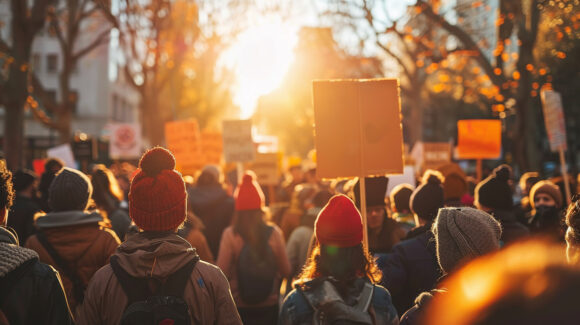A security fence rings a Las Vegas building where a Nevada county tabulates votes. An Arizona sheriff has his department on high alert to guard against potential violence with drones and snipers on standby. The National Guard has been or will be activated in 19 states so far to help maintain peace.
As a tense America votes on Tuesday for either Republican Donald Trump or Democratic Vice President Kamala Harris for president, concerns about potential political violence have prompted officials to take a variety of measures to bolster security during and after Election Day.
Many of the most visible moves can be seen in the battleground states that will decide the presidential election, states like Nevada where protests by Trump supporters broke out after the 2020 election.
This year, a security fence rings the scene of some of those protests – the Las Vegas tabulation center.
A defense official said on Monday that Alabama, Arizona, Delaware, Iowa, Illinois, North Carolina, New Mexico, Oregon, Wisconsin and Washington state have current National Guard missions while Washington DC, Colorado, Florida, Hawaii, Nevada, Oregon, Pennsylvania, Tennessee, Texas and West Virginia have troops on standby.
In Arizona, a similar metal fence has been erected at Maricopa County vote tabulation center in downtown Phoenix, a flashpoint in 2020 for rigged election conspiracy theories and threats against election officials.
County Sheriff Russ Skinner said his department will be on “high alert” for threats and violence and he has instructed staff to be available for duty.
“We will have a lot of resources out there, a lot of staff, a lot of equipment,” he added, noting deputies will use drones to monitor activity around polling places and snipers and other reinforcements will be on standby for deployment if violence appears likely.
He said “polarization” becomes more intense in the days after the election so law enforcement will remain on heightened alert and “there will be zero tolerance on anything related to criminal activity.”
Concerned about the potential for protests or even violence, several Arizona schools and churches that served as voting centers in the past will not serve as polling stations this year, a local election official told Reuters.
Church Buildings
The Church of Jesus Christ of Latter-Day Saints (LDS), which has over 400,000 members in Arizona, has offered several polling locations to fill the gap.
A dozen or so community leaders from across the state and from various political backgrounds and cultures have formed a committee to focus on stemming political violence, according to member Jane Andersen, an LDS church member and Protecting Democracy Specialist for Arizona at Mormon Women for Ethical Government.
The group says it is ready to tap into a broad network, including faith leaders, who can help spread factual information to counter misinformation-fueled unrest.
In the battleground state of Michigan in 2020, Trump supporters descended on the downtown Detroit convention hall and began pounding on windows as the counting of absentee ballots carried into a second day. Yellow bicycle racks this year lined both sides of the boulevard on which it sits.
Visitors must go through metal detectors and about 15 police officers are patrolling the cavernous hall. Daniel Baxter, Detroit’s chief operating officer for absentee voting and special projects, said police also are on the roof and surrounding the building. Eight days of early pre-processing of mail-in ballots have passed peacefully, Baxter said.
Peter Simi, a sociology professor at Chapman University in California who has researched threats against public officials, said the worst scenario would be Trump losing and not conceding defeat.
Rather than a repeat of the 2021 attack on the U.S. Capitol by Trump supporters, he said conflict could be “dispersed, diffuse events across multiple locations” that would be more difficult for law enforcement to address.
Precautions stretch beyond the battleground states. Oregon and Washington state authorities have said they have activated the National Guard. Some storefront windows in Washington, DC and elsewhere have been covered by plywood.
Back in Las Vegas, Faviola Garibay surveyed the security fence around the linen-colored building where Clark County officials tabulate the votes and where voters such as her can drop election ballots.
“The fencing, the presence of police here, it seems secure,” she said. “I feel safe voting.”
Was this article valuable?
Here are more articles you may enjoy.



 AI Claim Assistant Now Taking Auto Damage Claims Calls at Travelers
AI Claim Assistant Now Taking Auto Damage Claims Calls at Travelers  Insurify Starts App With ChatGPT to Allow Consumers to Shop for Insurance
Insurify Starts App With ChatGPT to Allow Consumers to Shop for Insurance  State Farm Adjuster’s Opinion Does Not Override Policy Exclusion in MS Sewage Backup
State Farm Adjuster’s Opinion Does Not Override Policy Exclusion in MS Sewage Backup  Munich Re Unit to Cut 1,000 Positions as AI Takes Over Jobs
Munich Re Unit to Cut 1,000 Positions as AI Takes Over Jobs 

